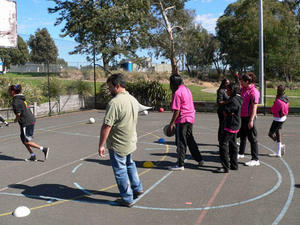Home > Make It Count 2 > Resources > Significant episodes > Big day out I
Big day out: Culture and maths come together I
Chris Matthews
Project Patron/Critical Friend
Healesville Cluster
Finding 1.2: Significance
Know what is significant in the daily, lived reality of learners so mathematics learning can be culturally relevant/connected as well as academically rigorous.
For me to even think about making connections between maths and culture, you have to think about what culture is and what mathematics is.
I don’t think many people talk about what mathematics is. I read a lot of education stuff and it is still stuck in the textbook mode. That is the epistemology of the Western world where they want to break things down into segments, but maths to me is about more than that. It is about connections and relationships, things that are more important, and that’s where culture comes in.
Some of today (the Big Day Out) was about getting kids to think and create. Some activities were about representations. There were exercises in creative thinking. The Elders were here partly to see if by sitting down and weaving or by constructing the humpies we could do more with the maths. It was also a chance for kids to connect with local Elders, which they might not have a lot of opportunity for. It was a chance to hear a story while they did the weaving and a chance to give the kids information that their culture is alive. Exposing them to that is important.
I think ‘community’ means a lot of different things, and of course it’s an abstract notion in itself. From my experience I think a lot of parents in general, not just Aboriginal parents, have to really acknowledge that they are the primary teachers of their children and not just hand it all over to the school. A lot of parents have a lot to offer but don’t understand that. For Aboriginal parents, it is especially important if they want culture to be taught. As a parent, whether it’s building a humpy, weaving, cooking, out in the bush, you can talk through a lot of ideas and processes that kids can take to the school.
It is important to create a community around the school with those ideas. Most kids come from an extended family of uncles, aunts, grannies, cousins as well as the nuclear family. If teachers understand where the child comes from they will have a richer experience at school.
This idea of culturally responsive pedagogy is at least partly about a space where you come together and talk about children's education and how we work together.
Some questions to prompt discussions with your colleagues:
- How do you perceive mathematics? What does it mean to you?
- What do you think might be some of the “ideas and processes” that Indigenous learners bring to school that could be used in the classroom to teach the mathematics curriculum?
- What other Cluster Findings can be found in this significant episode?
|
|
|
Want to know more about the Big Day Out?
- Go to the Cluster focus
- Check out the Unit of Learning Big day out.
- See Andrew Peters' significant episode Big day out II.

